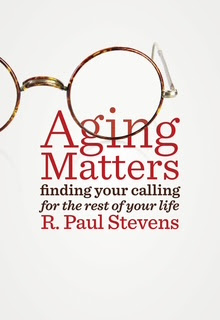| Book Summary and Reflection This is my second time reading Aging Matters. I first read it in 2020, but I don't remember reading it. After seeing a quote in another book, and checking it out on Amazon, I was surprised to find I owned it. My immediate reaction was I'd bought it and not read. Imagine my shock to find nearly 10% of the book was highlighted and I'd recorded it on my book blog—it had obviously struck a chord. As I reread, I found myself thinking more than a few times, "Ha, so this is where I got that idea!" The truths in these pages have quietly shaped my thinking, my teaching, and some decisions—without me realizing how deeply they'd taken root. I've read a few of Steven's books. He was a very early author in the Theology of Work space. As Cathy and I have downsized a few things, including my physical library, I've kept all of Stevens's books. The kids will have to decide what to do with them! I believe it was C.S. Lewis that said a book wasn't truly read until it'd been read twice.
From the book……R. Paul Stevens challenges the cultural script that aging equals retirement from meaning. Instead, he calls us to renewed vocation in later life. Work is not merely paid employment; it is creative, relational, and redemptive participation in God's world. At every age, our calling is to:
Aging itself becomes a spiritual discipline. Stevens describes three invitations:
Stevens redefines legacy: it's not about leaving something behind, but about passing something forward. It's not just financial—it's spiritual, relational, and eternal. He encourages us to:
The real question isn't, What did you accomplish? It's, Did you live faithfully with what God gave you? Personal TakeawayA lot has happened since I first read Aging. I made it 19 miles in my first marathon attempt. I completed Goggins' 4x4x48 Challenge, finished the 75 Hard Challenge, and did 1,000 pushups in 18 hours. I had a quintuple bypass. And I turned 70. And, most importantly, I seem to have slowly discovered some things about myself and my calling in what Steven's calls the third-third of life. Reading Aging Matters again now, and especially in this discover stage I realize I've been in, doesn't feel like coincidence. It feels like divine timing—like this book showed up again because it still has work to do in me. It was strange laying in that hospital bed two years ago and realizing I'd been reading Gary Black's Preparing for Heaven. Black and Stevens has helped me see aging as more than survival, though that's what it feels like some days. Aging is a calling to try to live intentionally, to try to love deeply, and to try leave a decent legacy. But, finishing well isn't about being remembered—it's about being faithful. I'm afraid one of the hardest things I will have done is to be able to say "I have fought the good fight, I have finished the race, I have kept the faith" (2 Timothy 4:7) and to hear "well done, good and faithful servant" (Luke 19:17). "Train hard, every day" isn't just for the physical part of our being. To that end….. Danny
Originally posted at https://dannylsmith.substack.com/p/book-summary-and-reflection-aging |
I agree with Tim Keller, “I read because I’m desperate.” While reading by itself will not make one a better leader or follower, reading well will improve both. Yet, even then, one must take the knowledge and allow it to change his/her life. Read purposefully.
Tuesday, April 22, 2025
Aging Matters: Finding Your Calling for the Rest of Your Life, by R. Paul Stevens
Wednesday, April 16, 2025
Let Your Life Speak - by Parker J. Palmer

In Let Your Life Speak, Parker Palmer doesn't hand us a roadmap — he invites us into a journey and it's a process of self-discovery and authenticity that requires us to slow down and pay attention to what our life has already been saying.
What our life has already been saying
Palmer shares from his own story — including seasons of depression, career misalignment, and honest wrestling — and through that, he urges us to listen more closely to our own. He flips the script on vocation. It's not something we chase or achieve. It's something we receive — something that rises up from who we already are, not who we think we have to become.
Our calling isn't out there somewhere. It's embedded in our design — in our gifts, passions, patterns, and even in our pain. Palmer draws a powerful contrast between the true self and the false self — the false self being shaped by other people's expectations, cultural pressure, or our own ambition. But true calling comes from living out of who we really are, even when that means embracing limitations or letting go of certain paths.
Palmer reminds us that the best leadership doesn't come from knowing who you are and leading from that place.
What stood out to me:
-
Vocation isn't a decision; it's a discovery.
-
The inner journey — even the hard parts — is where clarity often comes.
-
Real leadership flows from wholeness, not performance.
-
Your life is already speaking — the question is, are you listening?
"Vocation does not come from willfulness. It comes from listening." That one line sums up the heart of the book — and it's a timely reminder in a world that often demands more hustle than reflection. Sometimes the most courageous thing you can do is be still and listen to what God has already planted in you.
